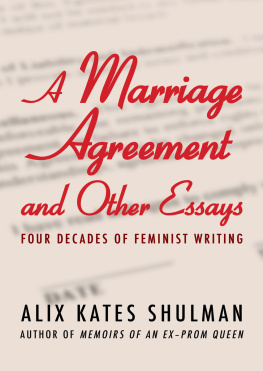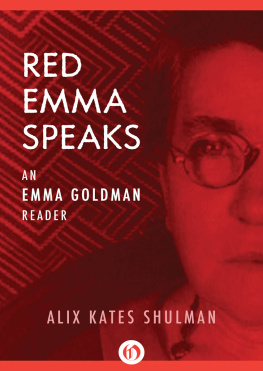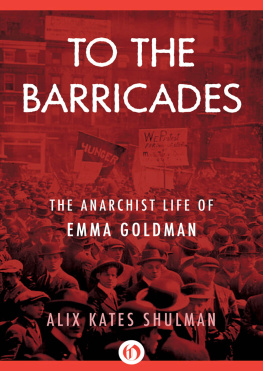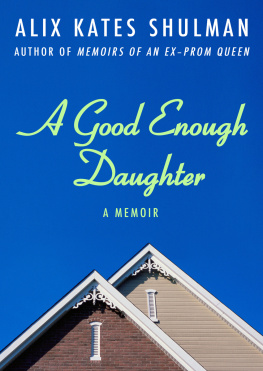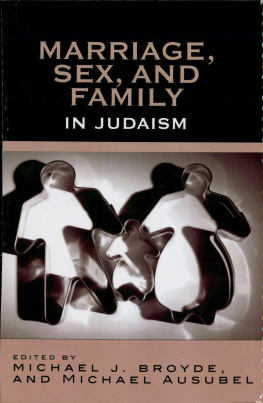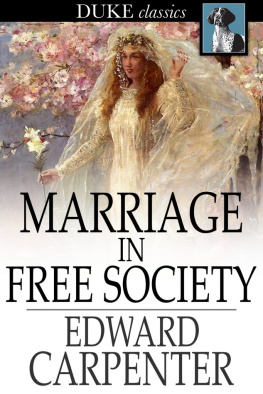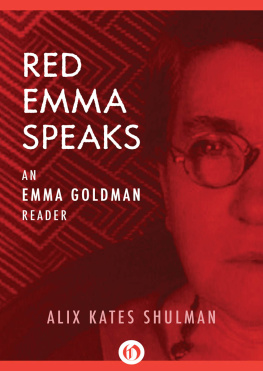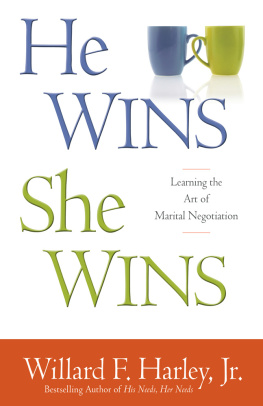A MARRIAGE AGREEMENT
AND OTHER ESSAYS
FOUR DECADES OF FEMINIST WRITING
ALIX KATES SHULMAN

For Ellen Willis (19412006) and for Emily
Introduction
I T WAS IN 1967, in the midst of that decade of emotional upheaval and political dissent, that I heard the first rumblings of the womens liberation movement. News reached me in my Greenwich Village apartment via the radio, while I was washing the dinner dishes. I was in my thirties, raising two small children and beginning to write.
On the air, several fervent young women were discussing the injustice of womens situation in words that spoke directly to me. When they invited their listeners to attend an upcoming meeting of the fledgling movement, I put down my sponge and picked up my pen. Jotting down the telephone number and date of the meeting, in that moment I launched myself into one of the great liberation movements of our time, which profoundly transformed the lives of women worldwide, mine included.
Soon I joined Redstockings, one of New Yorks first radical feminist groups. By then the young movement had put out broadsides by individual women on a range of issues but had yet to publish a comprehensive essay about sex. I volunteered to write one. In Organs and Orgasms I enlisted my scholarly skills to expose male bias in current sex research. Sex is always a juicy topic, and that piece debuted in the then-infamous Evergreen Review, but to my surprise it was a different essay I wrote around that time, A Marriage Agreement, proposing that men and women share all housework and childcare equally, that provoked the enormous response, both enthusiastic and dismissive. (In A Marriage Disagreement, written years later, I revealed the secrets behind that still-controversial proposal.)
Those early essays, written when the movement was young, outrageous, and explosive, were great fun to write. So were my 1970s novels, Memoirs of an Ex-Prom Queen, which dramatized why a movement was needed, and Burning Questions, a historical novel describing the rise of the movement itself. If those pieces now leave young readers, who grew up breathing feminist ideas, feeling more advanced than me, so much the better. It means that nowadays women expect to have more orgasms and expect men to wash more dishes (though, alas, not all their expectations will be fulfilled).
By the early 1980s the explosive phase of the movement was over, at least for the time beingexplosive and quiescent phases having alternated for several hundred years. Yet throughout that decade and the following, the ideas advanced by the movement were so warmly embraced by the mainstream that their very success sparked an organized, sometimes virulent backlash (including widespread bombings of abortion clinics and torture of gays), producing what became known as the culture wars.
In those politically confusing times, when our protests often felt ineffective, I was occupied writing books and teaching writing, sometimes in such alluring places as Maine, Colorado, and Hawaii. So its no wonder that my essays focused mainly on writing. During a culture war a literary essay may be a missile.
Then, as the twentieth century segued into the twenty-first, I entered old age, as will happen to the lucky. Several events that should shock no one somehow walloped me. First, my aged parents died on my watch (inspiring my memoir A Good Enough Daughter). Then my friends and comrades began to die, making me a connoisseur of memorials and an author of obituaries. Finally, my 75-year-old husband fell nine feet from a sleeping loft, causing a traumatic brain injury that left him with severe dementia and led me to advocate for the elderly. (Too bad that we who once marched for free universal child care werent prescient enough to also demand free elder care for the nearly half of those over eighty who will wind up with dementia.)
Advocates, no matter how old, face forward and upward toward the light; funerals can only momentarily divert them. This upward gaze has always marked my work, including my memoir about my husbands decline, To Love What Is, and the essays in the final section of this book. Whether taking stock, as in Thoughts at Seventy, or claiming the respect due me as a Jew in Summer Jew or due my disabled husband in my essays about dealing with his dementia, I find myself on the eve of eighty still squinting up at the sun, despite the persistence of some of the very injustices that first made me an activist and writer.
In summer 2011, forty-two years after I wrote A Marriage Agreement, Time ran a cover story called Chore Wars on current domestic gender imbalances. Four decades after we successfully legalized abortion and in face of a citizenry overwhelmingly in favor of contraception and abortion, several states are proposing annoying initiatives to endow fertilized eggs with the rights of persons at the expense of the rights of women. In our violent world, girls are trafficked everywhere, and recently in Afghanistan two more women accused of adultery were stoned and killed. The crazed killer who massacred scores of Norwegians in 2011 blamed his rage partly on feminist ideas, citing in his 1,500-page manifesto the writings of Betty Friedan and my brilliant Redstockings sister, the late Ellen Willis. (This called to mind the 1989 Quebec Massacre of female students by a gunman who shouted as he opened fire, I hate feminists!) But, as I try to show in The Kenning, the final piece in this collection, each generation can do no more than add its bit to the endless river of consciousness and change, and thats about as good as it gets.
Alix Kates Shulman
New York City
MARRIAGE AND MEN
A Marriage Agreement
W HEN MY HUSBAND AND I were first married, a decade ago, keeping house was less a burden than a game. We both worked full time in New York City, so our small apartment stayed empty most of the day and taking care of it was very little trouble. Twice a month wed spend Saturday cleaning and doing our laundry at the laundromat. We shopped for food together after work, and though I usually did the cooking, my husband was happy to help. Since our meals were simple and casual, there were few dishes to wash. We occasionally had dinner out and usually ate breakfast at a diner near our offices. We spent most of our free time doing things we enjoyed together, such as taking long walks in the evenings and spending weekends in Central Park. Our domestic life was beautifully uncomplicated.
When our son was born, our domestic life suddenly became quite complicated; and two years later, when our daughter was born, it became impossible. We automatically accepted the traditional sex roles that society assigns. My husband worked all day in an office; I left my job and stayed at home, taking on almost all the burdens of housekeeping and child rearing.
When I was working I had grown used to seeing people during the day, to having a life outside the home. But now I was restricted to the company of two demanding preschoolers and to the four walls of an apartment. It seemed unfair that while my husbands life had changed little when the children were born, domestic life had become the only life I had.
I tried to cope with the demands of my new situation, assuming that other women were able to handle even larger families with ease and still find time for themselves. I couldnt seem to do that.

